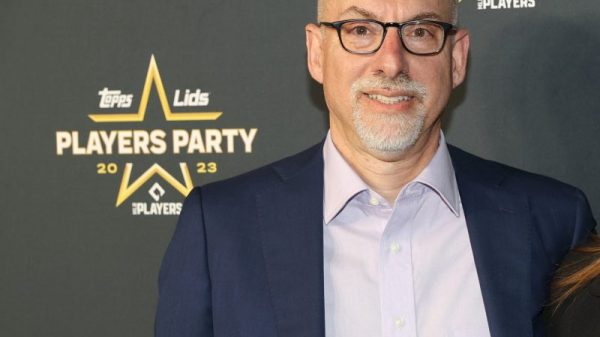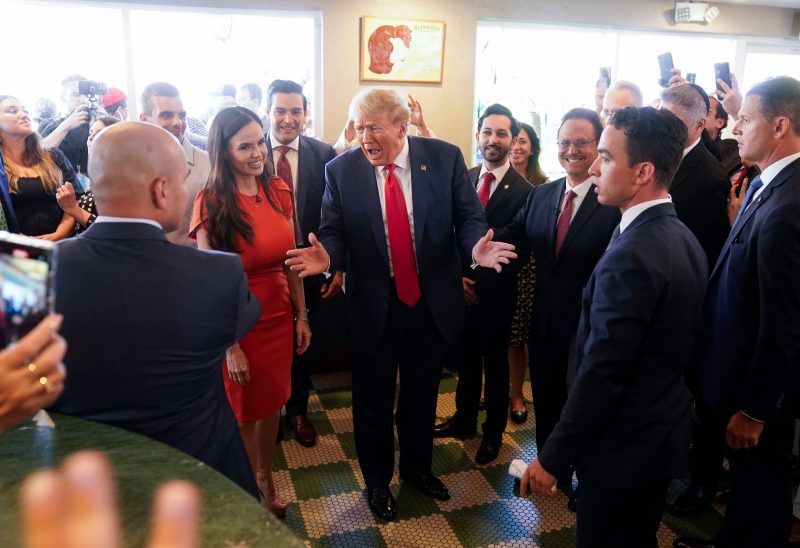Speaking to his supporters hours after he pleaded not guilty to federal charges of keeping and stashing sensitive government documents in his Florida home, former president Donald Trump said at his New Jersey golf club that he was the victim of a double standard.
To prove his point that he should be acquitted, Trump mentioned an obscure case that he wanted his fans to know about. It involved the sock drawer of former president Bill Clinton.
“Under the Presidential Records Act — which is civil, not criminal — I had every right to have these documents,” Trump said, incorrectly describing the law that has no enforcement mechanism, and which is separate from the federal statutes Trump is actually charged under. “The crucial legal precedent is laid out in the most important case ever on this subject, known as the Clinton socks case.”
He added, “You know what that means?”
Trump: Bill Clinton Kept 79 Audio Tapes in ‘Sock Drawer’ Containing U.S. Military, Foreign Policy Discussions pic.twitter.com/osEw8s8CwI
— Alexandra Datig | Front Page Index (@alexdatig) June 14, 2023
For those who don’t know what Trump is talking about, Clinton asked Pulitzer Prize-winning historian Taylor Branch, a biographer of the Rev. Martin Luther King Jr., and a roommate of Clinton’s during George McGovern’s 1972 presidential campaign, to come to the White House 79 times for interviews during his presidency. The interviews, many of which took place late at night, would act as a personal diary for Clinton’s eight years in office as they were happening.
But Clinton was so worried that his staff would leak the audio of the personal records between him and Branch that the president kept the cassette tapes of the interviews hidden in his sock drawer. The tapes, which were taken by Clinton when he left office and never publicly released, were the basis for Branch’s 2009 book, “The Clinton Tapes,” about the Democrat’s tumultuous presidency. Branch mentioned that Clinton kept the tapes in his sock drawer while promoting the book.
“[Clinton] showed me where he was keeping the tapes, and there were these two little boxes for each set of the tapes in the sock drawer,” Branch told The Washington Post on Thursday. “He would leave, since he’s the president and he’s busy, and I’d put the tapes in there.”
More than a decade after a conservative activist group’s legal efforts to designate the Clinton tapes as presidential records under the Presidential Records Act were defeated in court, Trump and his allies are using the sock drawer as a rallying cry for his acquittal. The mention of the Clinton case has garnered attention on conservative media and among Trump’s followers on social media this week. But historians, legal experts and fact-checks have said the circumstances surrounding the personal audio conversations in the sock drawer don’t bear much resemblance to the boxes of classified documents allegedly stored in Trump’s chambers at Mar-a-Lago and crammed into a bathroom.
Trump is also not facing any charges of violating the Presidential Records Act. Instead, the indictment against Trump accuses him of violating the Espionage Act by unlawfully retaining government secrets, among other charges.
“It’s mostly been amusing,” Branch, 76, said of the attention Trump has brought to his interviews with Clinton. “On its face, those tapes were always an oral history or a personal diary.”
He added, “Sock drawer was a catchy phrase, but I’m embarrassed I put it out into the public because I’m pretty sure Clinton would have never said where they were. And I’m embarrassed to say that Trump finds it catchy, too.”
Trump faces 37 felony counts for allegedly stashing secret papers throughout his Mar-a-Lago residence in Palm Beach, Fla., after leaving the White House and allegedly hiding them from the government.
Even before he pleaded not guilty on Tuesday, Trump and his legal team have argued that the Presidential Records Act gives the president the right to take any record upon leaving office and declare it personal. In reality, the 1981 law requiring White House documents to be preserved as property of the U.S. government was established, in part, so that presidents could not declare every record to be personal.
The push to differentiate presidential and personal records came in the years following the Watergate scandal, when President Richard M. Nixon considered destroying a secret collection of tapes until they were made public property. Since then, the Presidential Records Act has been the standard for every president.
Not long after Clinton won the 1992 presidential election, Branch recalled how the president-elect had asked his old friend to come see him. Immediately, Branch said he could tell that Clinton was obsessed with how history would look upon his presidency, even before it began. Clinton, who had been a fan of Branch’s biography of King, wanted to see what could be done to capture the personal records and reflections on his administration in real-time conversations as the presidency was unfolding.
Branch had a suggestion — and it involved a cassette recorder.
“He said, ‘It’s impossible to keep a diary, I can’t just sit around and talk into a recorder,’” Branch recalled. “I said, ‘Oral histories were created after World War II for precisely that reason.’ But I told him it would be hard to keep it a secret since that if people found out, they were going to find a way to get a subpoena to access it.”
So 79 times between Jan. 20, 1993, and Jan. 20, 2001, Branch traveled from Baltimore to D.C. to visit the White House late at night for interviews that the president kept secret from his own staff, the historian said. Branch recorded the talks on two recording devices and sometimes stayed overnight in D.C. when the talks with Clinton stretched on for hours, he recalled.
Then, at the end of one night, while rewinding the cassette player to prepare a tape, Branch saw where Clinton was keeping the recordings.
“After a while, he said ‘You rewind it, I’ve got to go do something,’” Branch said. “And that’s when he showed me where he was keeping the tapes, in his sock drawer.”
Branch publicly acknowledged the sock-drawer anecdote in 2009 when promoting his book to outlets such as NPR and GQ. The location of the Clinton tapes became a legal issue in 2010, when Judicial Watch sued the National Archives and Records Administration (NARA) to declare the audio conversations to be presidential records and for the conservative activist group to have access to them.
But the legal effort was defeated in 2012 after U.S. District Judge Amy Berman Jackson ruled that NARA didn’t have the authority to get the personal records from Clinton and force him to hand them over.
In an opinion article for the Wall Street Journal this week, Michael Bekesha, a senior attorney for Judicial Watch, argued that the organization lost because Jackson “concluded the government’s hands were tied.”
“Mr. Clinton took the tapes, and no one could do anything about it,” Bekesha wrote. “The same is true with Mr. Trump.”
Branch disagreed, saying he never considered the legal effort from Judicial Watch to get the Clinton tapes to be serious because he was not called to be a witness.
“Judicial Watch lost the case, and it was not a close case,” Branch said. Branch said “it’s amazing” that Trump’s team would cite the “failed case as a precedent for excusing Trump and how he handled classified government documents.”
It’s unclear if Clinton’s sock-drawer tapes will ever be released, but Branch doubts that the public will have access to the former president’s personal records. He remembered how Clinton told him that he feared the public would distort the context of the tapes, and that people would only care about Monica Lewinsky and the scandal that led to his impeachment.
A spokesperson for Clinton did not immediately respond to a request for comment.
“I’m sure he’d be amused by everything that’s going on now,” Branch said, “but I don’t know if he’s ever going to release them.”
Branch is hopeful that people will see that the cases involving Clinton and Trump are drastically different, and that people can “keep a good sense of proportion of what’s really important.” He also clarified that he does not keep any recordings of late-night conversations in his own sock drawer.
“Well, I keep a lot of socks in there,” Branch said, laughing. “The only story in my closet is I’m grieving over the loss of my necktie collection since no one wears neckties since covid. That’s the closest thing I have to a sock-drawer issue.”



























